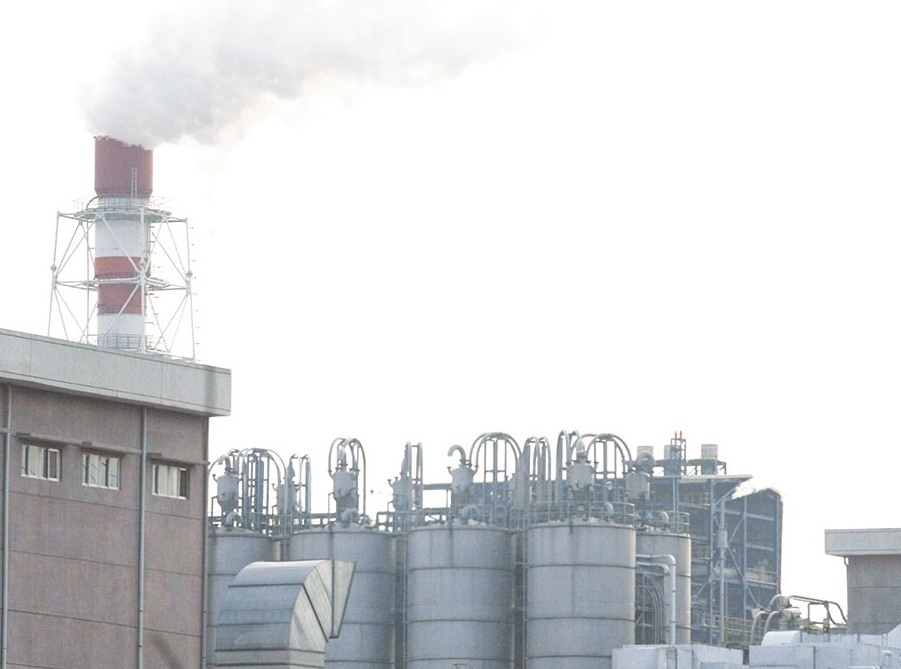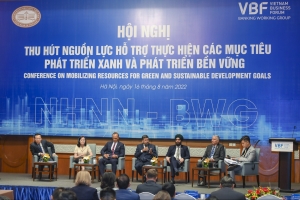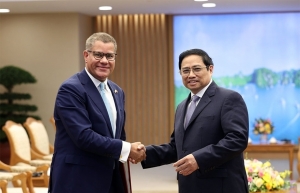Backing up Vietnam’s COP26 goals
Looking to drive Vietnam’s progress on a clean energy transition ahead of the COP27 climate summit to be held in November in Egypt, COP26 president Alok Sharma last week paid his third visit to Vietnam since Prime Minister Pham Minh Chinh last November impressed the international community by making a 2050 net zero commitment and other strong ones.
 |
| Total financing needs could reach 6.8 per cent of GDP per year, Le Toan |
Sharma is driving forward discussions on a just energy transition partnership and seeing the impacts of climate change in the country.
The partnership will be a long-term political agreement between the Vietnamese government and a group comprising the United Kingdom, European Union, France, Germany, Japan, and the United States.
“This country-led partnership will support Vietnam to accelerate its transition away from coal as part of the country’s commitment to its 2050 net-zero target and its ambitious Power Development Plan VIII (PDP8),” said the British Embassy to Vietnam in a press release. “The partnership will be underpinned by clear plans to deliver a just energy transition and catalyse clean energy investment, offering Vietnam the opportunity to become a world leader in renewable energy.”
Sharma said, “Urgent action is needed to limit the global temperature increase to 1.5 degrees and help build prosperous, low-carbon, resilient communities across the planet. The proposed partnership provides an opportunity for Vietnam to accelerate its transition away from coal in delivery of its 2050 net-zero target.”
“A clean, just energy transition not only delivers enhanced climate action, but it will also help create new jobs, economic growth, clean air, and a prosperous future,” he added.
The COP26 president wants Vietnam to review and update the provisions of the law to create favourable conditions for private investors to participate in the energy transition, phasing away from coal and supporting PDP8.
Andrew Jeffries, country director for Vietnam at the Asian Development Bank told VIR that it can help Vietnam access highly concessional climate finance to help bring down the borrowing costs for energy transition investments.
“The PDP8 has incorporated the country’s net-zero ambition and aims to have no new coal-fired power plants, except those already under construction or planned to complete by 2025 or sooner,” said Jeffries.
Vietnam has capitalised on opportunities in renewable energy,” he continued. “The country became the first mover in floating solar and has demonstrated success in rooftop solar, which contributed to 48 per cent of the country’s solar capacity in 2020. Vietnam also boasts favourable conditions for the development of wind power, with installed capacity expected to grow to more than 20GW by 2045.”
According to the World Bank, to ensure sufficient funding for responding to climate change, mobilising domestic finance is possible but external support is needed. Overall, Vietnam’s total incremental financing needs for the resilient and decarbonising pathways could reach over $368 billion between now and 2040, or approximately 6.8 per cent of GDP per year. The resilient pathway alone will account for about two-thirds of this amount as substantial financing will be required to protect the country’s assets and infrastructure as well as vulnerable people.
The cost of the decarbonising pathway will mainly arise from the energy sector; investments in renewables and managing the transition away from coal might cost around $64 billion between now and 2040. All the figures are in net present value terms at a discount rate of 6 per cent.
This $368 billion in financing needs will include $184 billion from private investments or about 3.4 per cent of GDP annually, $130 billion or about 2.4 per cent of GDP annually from the state budget; and $54 billion or about 1 per cent of GDP per year from external sources. “Satisfying the funding gap associated with implementing the resilient and decarbonising pathways will require a reallocation of domestic private savings toward climate-related projects, an increase in public savings, and external financial support,” said the World Bank’s Climate and Development Report for Vietnam, released in July.
“Aggressive efforts could help mobilise private financing in the range of 3.4 per cent of GDP per year. This can be achieved by mobilising green credit by banks, developing market-based instruments such as green equities and green bonds, and applying de-risking tools,” the report added. “Green finance is in its infancy in Vietnam, and public policy has an important role in helping banks overcome internal and external bottlenecks through regulatory reforms and incentives to both credit providers and borrowers.”
At COP26, Prime Minister Chinh also endorsed initiatives on forest land use, forest finance, methane, a clean power transition, sustainable food and agriculture, and climate resilience.
 | Vietnam to mobilise $360 billion for sustainable development targets According to Nguyen Thi Bich Ngoc, Deputy Minister of Planning and Investment, Vietnam needs to mobilise $360 billion for implementing its green and sustainable development targets by 2030, 50 per cent of which will come from the private sector. |
 | PM hails contributions of COP26 President Prime Minister Pham Minh Chinh has hailed President of the 26th United Nations Climate Change Conference (COP26) Alok Kumar Sharma, who is also British Minister for the Cabinet Office, for his contributions to stepping up the delivery of COP26 commitments. |
What the stars mean:
★ Poor ★ ★ Promising ★★★ Good ★★★★ Very good ★★★★★ Exceptional
Related Contents
Latest News
More News
- $100 million initiative launched to protect forests and boost rural incomes (January 30, 2026 | 15:18)
- Trung Nam-Sideros River consortium wins bid for LNG venture (January 30, 2026 | 11:16)
- Vietnam moves towards market-based fuel management with E10 rollout (January 30, 2026 | 11:10)
- Envision Energy, REE Group partner on 128MW wind projects (January 30, 2026 | 10:58)
- Vingroup consults on carbon credits for electric vehicle charging network (January 28, 2026 | 11:04)
- Bac Ai Pumped Storage Hydropower Plant to enter peak construction phase (January 27, 2026 | 08:00)
- ASEAN could scale up sustainable aviation fuel by 2050 (January 24, 2026 | 10:19)
- 64,000 hectares of sea allocated for offshore wind surveys (January 22, 2026 | 20:23)
- EVN secures financing for Quang Trach II LNG power plant (January 17, 2026 | 15:55)
- PC1 teams up with DENZAI on regional wind projects (January 16, 2026 | 21:18)

 Tag:
Tag:




















 Mobile Version
Mobile Version